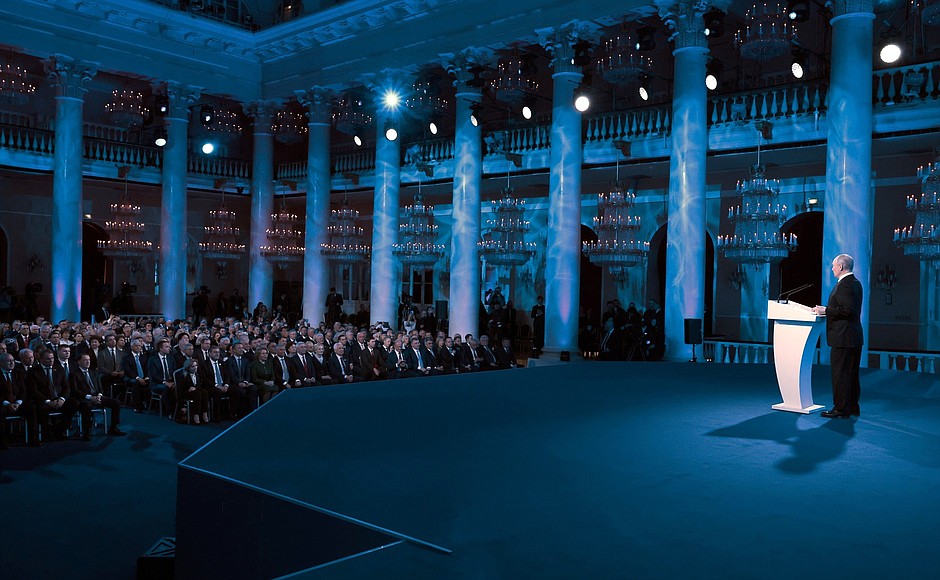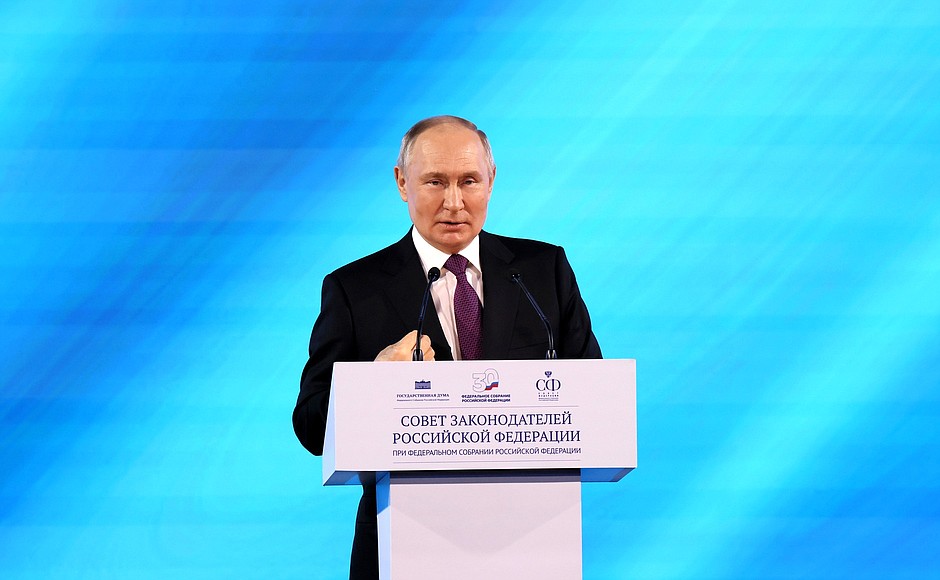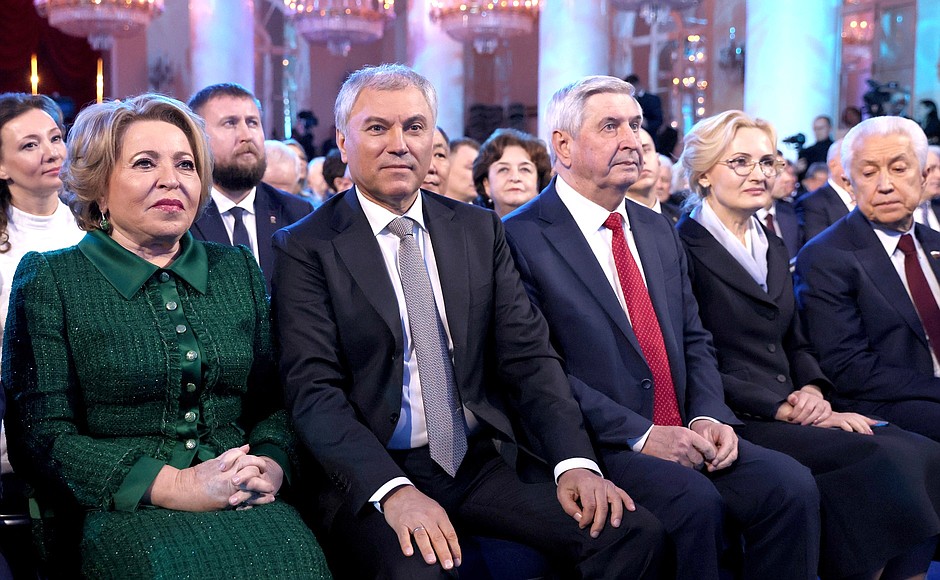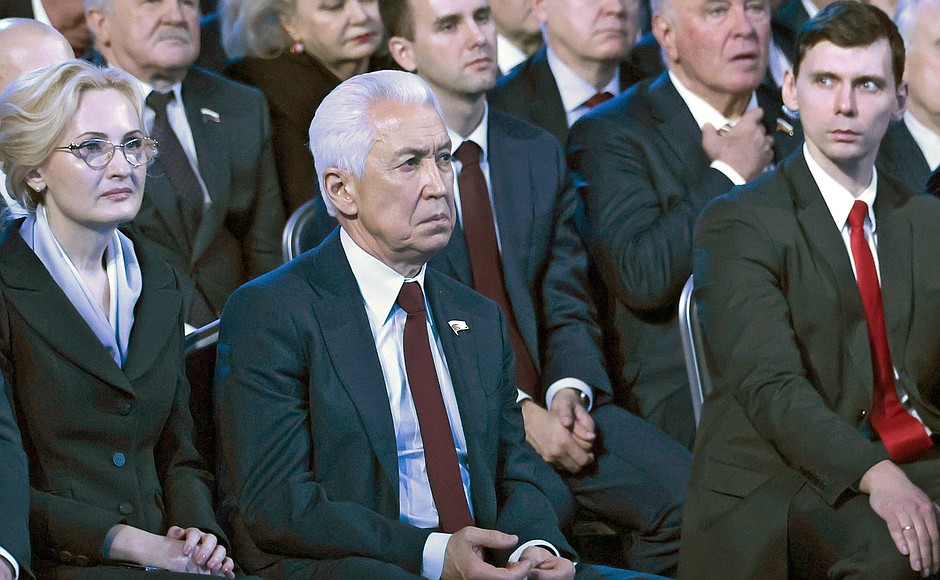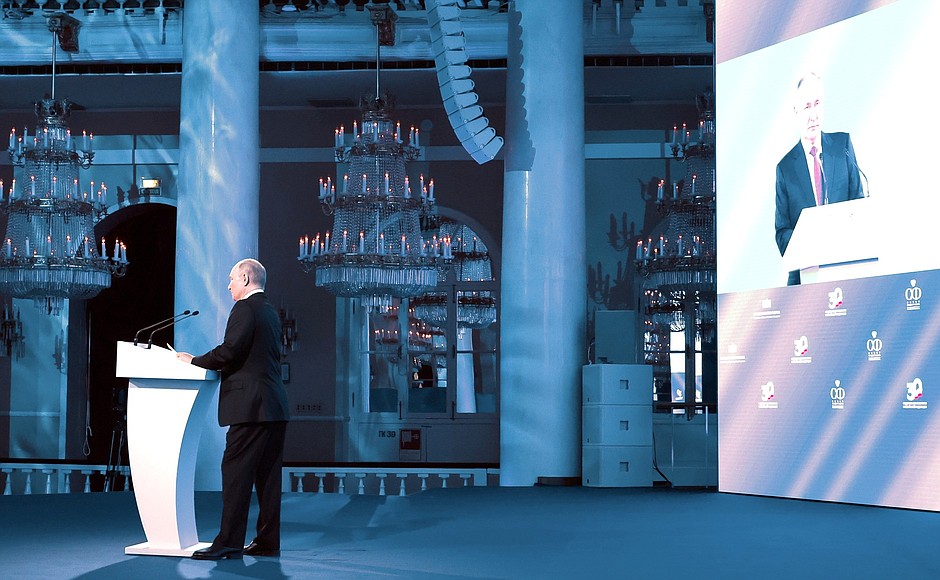President of Russia Vladimir Putin: Colleagues, friends,
Madam Matviyenko, Mr Volodin,
Welcome to our traditional meeting.
In the past, we met in a restricted format and in a different situation. But as I understand it, today we have met not only to review the results of the year but also on the occasion of the 30th anniversary of the Federal Assembly of Russia. First of all, I would like to congratulate you all, the senators and the deputies of the State Duma, on this event, the 30th anniversary of the Federal Assembly of the Russian Federation.
Our present-day parliament and its two houses were established following the election held on December 12, 1993, the day when we adopted our Constitution. The entry of the new Fundamental Law into force and the start of the operation of a democratically elected representative and legislative body of power were extremely important, without any exaggeration, for strengthening our statehood and the system of power as a whole. It was extremely important for the restoration of public stability, for conducting a meaningful dialogue between various political forces on the key issues of the country’s development agenda, and for addressing the practical issues that were and still are of concern to the people.
Of course, I know that some people in this room experienced all of this; they took decisions and can say that they adopted those laws, but they were not implemented. Some of them were not implemented, but others were put into operation. It is true that many laws remained ineffective. I can see Mr Zyuganov smiling, which means that he shares this view.
But do you know the meaning and value of the decisions we adopted? They created the legal foundations of our new statehood. This alone is very important: we created the foundations and set the guidelines. And after that, we used those guidelines to gradually, working jointly with deputies at all levels, including regional legislatures, restore constitutional order and discipline and ensure compliance with these laws. Without those laws, we would not have had a legal framework. It was an extremely important event in the life of our country.
One of the provisions contained in the Constitution is of critical importance. It is a matter of principle, in fact: it is the people of Russia who act as the bearers of sovereignty and the only source of power. The Constitution contained other fundamental provisions, guaranteeing the rights and freedoms of individuals, stipulating Russia’s commitment to social welfare and rule of law, regulating the federal structure – an instrumental factor for preserving Russia’s integrity. It provided for restoring and maintaining a single legal framework across our country in all its vastness and diversity.
The Constitutional norms have always enjoyed direct force taking precedence over all other norms and regulations. However, it was the parliament’s role to make sure that we discover and harness the meaning, essence and legal potential of practically every article contained in the Fundamental Law which de facto amounted to creating our new national legislation. A legislation that would ensure unity and harmonious development of a strong sovereign state with a free, responsible, and active civil society.
This was an extremely challenging, ambitious and very demanding task, and we are continuing these efforts today as we streamline our laws and regulations to make them more effective considering the new reality we live in and the challenges we face.
Here I would like to remind you that despite all the hardships we faced at the time, our parliament has been able to adopt several major instruments during the first two years of its work, such as the Law on the Constitutional Court, the first part of the Civil Code, and the Family Code. They remain in full force and effect to this day, along with the amendments adopted over the years.
Of course, starting with its first sessions, the parliament has gradually developed its rules of procedure by giving the legislative process its own intricate logic and then by fine-tuning its key stages and procedures, as well as by developing a legal standard for its legislative acts. A parliamentary tradition of engaging in a constructive public debate was born with various political forces treating each other with respect and the tradition of taking into consideration the opposition’s opinion, including when designating members of parliament to senior roles within the State Duma and regional legislative assemblies.
I would like to place a special emphasis on your joint efforts on the parliamentary diplomacy track. Members of both the Federation Council and the State Duma, as well as our colleagues in the regions and municipalities were bold, proactive and professional in the 1990s and in the 21st century when working on international platforms. They made a major contribution to reviving and gradually reinforcing our country’s image and influence, as well as in promoting Russia’s sovereign policy as one of the leading forces within the global majority and the backer of an objective process to build a multipolar world order with better justice for all.
The recent meeting with the leaders of parliamentary parties represented in the State Duma was substantive and specific; I think my colleagues will confirm this. Later on, we talked with each of them separately about the issues that are of interest to them and their parliamentary parties. We noted that all of us, primarily you, of course, are preserving the historical continuity and respect for the heritage of domestic parliamentarism and the people’s power that took shape in the early 20th century during the first dumas and even earlier. If we recall the Novgorod Veche (we look to the Novgorod Veche all the time), it was described to us in great detail in school. But such bodies of representative authority were not limited to Novgorod. They also existed in many other lands (or regions, as we say now). It was more than just Novgorod that was distinguished by this.
People’s gatherings, assemblies and later the experience of county self-government – all of them are important, all of them are our heritage. This link of times, a principle of the continuity of state development definitely enriches our experience. They emphasise and enhance our sovereign world outlook, political and parliamentary culture and help us take balanced, responsible decisions.
In the past few years, the work of both the federal and regional parliaments and local representative authorities has become more mature and professional. This reflects the quality of your work. I will also recall that the amendments introduced to the Constitution in 2020 also expanded the powers of both chambers of the Federal Assembly, significantly strengthened their influence and status in a single system of public authority.
Colleagues,
I would like to thank you and all your colleagues, Russian legislators, for your joint position on the most important steps aimed at supporting Russian families, our education, healthcare, preserving our culture and traditional values, and strengthening the security and economic sovereignty of Russia. These tasks are not easy.
I understand – you are public figures and have to meet with people and explain why these or other decisions are made. You are working professionally on these issues and sometimes, the adopted decisions are out of line. They are different from the common understanding of what is good and what is bad. But if a person understands and is convinced himself of the need to make these or other decisions, it is easier for him to bring his position home to his constituency. This is very important. A responsible attitude towards this work means a responsible attitude towards one’s responsibilities and to the people voting for you.
Of course, I am talking about strengthening our national security in general and defending our compatriots in Donbass and Novorossiya. I understand we have our comrades here with us today who chair the parliaments in our four historical regions: the Donetsk and Lugansk people’s republics, and the Kherson and Zaporozhye regions. These assemblies were elected under Russian law. I suggest that we give them a special welcome. We wish you every success and all the best in your work. We do understand the challenges and the risks you face, but people there are so resilient and reliable, and they know what they are after and why they decided to serve in these bodies of authority. They are there to serve people.
Let me note that over the past year, you adopted an entire package, which includes several dozen laws, to support our heroes taking part in the special military operation, as well as their families. Importantly, in most cases, all party factions in the State Duma came together to adopt these laws which matter so much for the country and our people. This ability to consolidate around vital national causes is of great significance for our state. Thank you very much. The Federation Council then took over and demonstrated the same unanimity. I have already said this but let me reiterate that this clearly demonstrates how consolidated our society has become.
Taking this opportunity, I would like to ask the dedicated parliamentary group to continue its work regarding the special military operation. It includes senators, deputies from all State Duma party factions, as well as representatives of the Defence Ministry and frontline correspondents. I regularly receive reports from our colleagues along with their substantive proposals. Many of those proposals, including on social and legal protection of soldiers and war veterans, have already made it into law.
Friends,
There are so many tasks facing us and they require our constant attention, more decisions and of course effective legislative support at the federal and regional levels. I am certain that the sense of responsibility each of us has and the deep understanding of our common goals and vital interests of the people of Russia will guide us in our joint efforts.
Once again, congratulations on the 30th anniversary of the Federal Assembly and the Constitution of Russia, and of course, Happy New Year. My best wishes to all of you.
Thank you very much.
